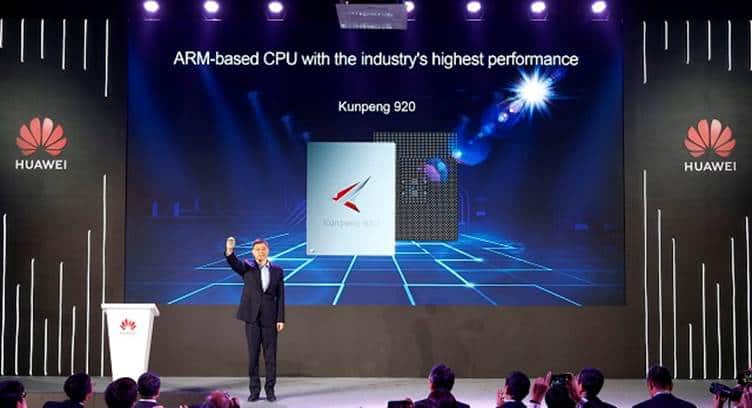Huawei announced the industry's highest-performance Advanced RISC Machine (ARM)-based CPU.
Called Kunpeng 920, the new CPU is designed to boost the development of computing in big data, distributed storage, and ARM-native application scenarios. Huawei will join with industry players to advance the ARM industry and foster an open, collaborative, and win-win ecosystem, taking computing performance to new heights.
The industry's highest-performance ARM-based CPU
Kunpeng 920 is the industry's highest-performance ARM-based server CPU, claims Huawei. Using the cutting-edge 7nm process, the CPU was independently designed by Huawei based on ARMv8 architecture license. It significantly improves processor performance by optimizing branch prediction algorithms, increasing the number of OP units, and improving the memory subsystem architecture. At typical frequency, the Kunpeng 920 CPU scores over 930 in the SPECint Benchmarks test, which is 25% higher than the industry benchmark. At the same time, power efficiency is 30% better than that offered by industry counterparts. Kunpeng 920 provides much higher computing performance for data centers while slashing power consumption.
Kunpeng 920 integrates 64 cores at a frequency of 2.6 GHz. This chipset integrates 8-channel DDR4, and memory bandwidth exceeds incumbent offerings by 46%. System integration is also increased significantly through the two 100G RoCE ports. Kunpeng 920 supports PCIe 4.0 and CCIX interfaces, and provides 640 Gbps total bandwidth. In addition, the single-slot speed is twice that of the incumbent offering, effectively improving the performance of storage and various accelerators.
Huawei TaiShan, ARM-based server with the industry’s best performance
Huawei today also released its TaiShan series servers powered by Kunpeng 920, including three models: one with a focus on storage, another on high density, and a third focused on balancing both requirements. The TaiShan servers are built for big data, distributed storage, and ARM-native application scenarios. The ARM architecture is best suited for these scenarios with advantages in many-core and performance per watt.
TaiShan will enable computing platforms with high performance and low power consumption for enterprises. For example, in big data scenarios, the TaiShan servers are tuned for optimal many-core high concurrency and resource scheduling to deliver a 20% computing performance boost. Based on the TaiShan servers, Huawei Cloud also provides elastic cloud services, bare metal services, and cloud phone services.
William Xu, Director of the Board and Chief Strategy Marketing Officer, Huawei
We believe that, with the advent of the intelligent society, the computing market will see continuous growth in the future. Currently, the diversity of applications and data is driving heterogeneous computing requirements. Huawei has long partnered with Intel to make great achievements.




















